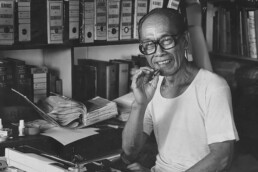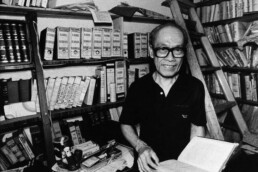In the quiet town of Blora, Central Java, exactly one century ago in 1925, a literary titan was born. Pramoedya Ananta Toer often referred to simply as Pram, would grow to become one of Indonesia’s most celebrated yet polarising writers. His works spanned decades of political turmoil, social upheaval, and cultural awakening, and through them, he chronicled the soul of a nation grappling with its identity. Born at a time when Indonesia was still shackled under colonial rule, Pram’s life and legacy are inextricably tied to the nation’s century-long journey of transformation. Pram’s life was one of resilience—a life that not only mirrored Indonesia’s struggles but also its indomitable spirit.
His journey began in a colonial era, under Dutch rule, and continued through the Japanese occupation, Indonesia’s fight for independence, and the political turbulence that followed. As the eldest of nine children in a modest Javanese family, he inherited a deep love for storytelling from his father, a schoolteacher, and his mother, a trader. This foundation of oral tradition and an exposure to literature ignited Pramoedya’s passion for writing, which became his tool for challenging authority and exposing societal truths.
This literary legacy is best embodied in his renowned Buru Quartet, a series of four novels: This Earth of Mankind, Child of All Nations, Footsteps, and House of Glass. These novels, written during his imprisonment on Buru Island without access to pen and paper, were dictated to fellow prisoners and later smuggled out. The Buru Quartet is more than historical fiction; it is a rich, layered depiction of Indonesia’s journey from colonial subjugation to a burgeoning nationalist movement. Through the protagonist Minke, Pramoedya explores themes of identity, resistance, and the complexities of a multicultural society under colonial rule.
Beyond the Buru Quartet, He authored numerous essays, short stories, and novels that addressed themes of oppression, human dignity, and freedom. Works such as The Fugitive and The Girl from the Coast showcased his ability to weave personal stories with broader socio-political contexts, making his writings both intimate and universal.
His life was marked by a relentless pursuit of truth, often at great personal cost. During the Japanese occupation in World War II, he worked for a nationalist news agency, a period that honed his critical perspective on imperialism. Post-independence, his outspoken criticism of government corruption and injustice made him a target. The New Order regime under Suharto saw him imprisoned without trial for 14 years, much of which he spent in isolation on Buru Island. It was here, under the harshest conditions, that Pramoedya’s creative spirit refused to be silenced.
This imprisonment epitomised his role as a dissident. His works were banned, his voice censored, yet his stories continued to inspire generations of readers. Even in exile, he remained a symbol of intellectual resistance against authoritarianism.
His life and works were a source of profound inspiration, but they were not without controversy. To his admirers, he was a fearless advocate for justice, a writer who gave voice to the marginalised. His ability to humanise historical narratives made him a powerful figure in the literary world.
However, critics accused him of being too sympathetic to the Indonesian Communist Party (PKI), particularly during the politically charged 1960s. His association with leftist ideologies led to accusations that he ignored or romanticised certain aspects of history. He himself maintained that his writings were not about endorsing ideologies but about exploring humanity’s struggles and aspirations.
His works were censored in Indonesia for decades, and his international recognition—which included nominations for the Nobel Prize in Literature—was met with mixed reactions at home. To this day, his legacy sparks debate among scholars, readers, and political commentators.
Pramoedya Ananta Toer passed away in 2006, but his influence endures. His writings have been translated into dozens of languages, reaching readers across the globe. For Indonesians, his stories remain a mirror reflecting the nation’s triumphs and tribulations.
His ability to write with both empathy and unflinching honesty makes his works timeless. He showed that literature is not merely an art form but a means of resistance, a way to preserve history, and a call to action. His life, fraught with personal sacrifices, reminds us that freedom of expression often comes at a high price—a price he willingly paid.
As the world marks a decade since his birth, This legacy invites us to revisit not just his writings but also the values he stood for: courage, integrity, and an unwavering belief in the power of stories to shape society. In an era where voices are still silenced and histories are contested, Pramoedya’s life and work remind us of the enduring power of words to challenge, inspire, and transform.



